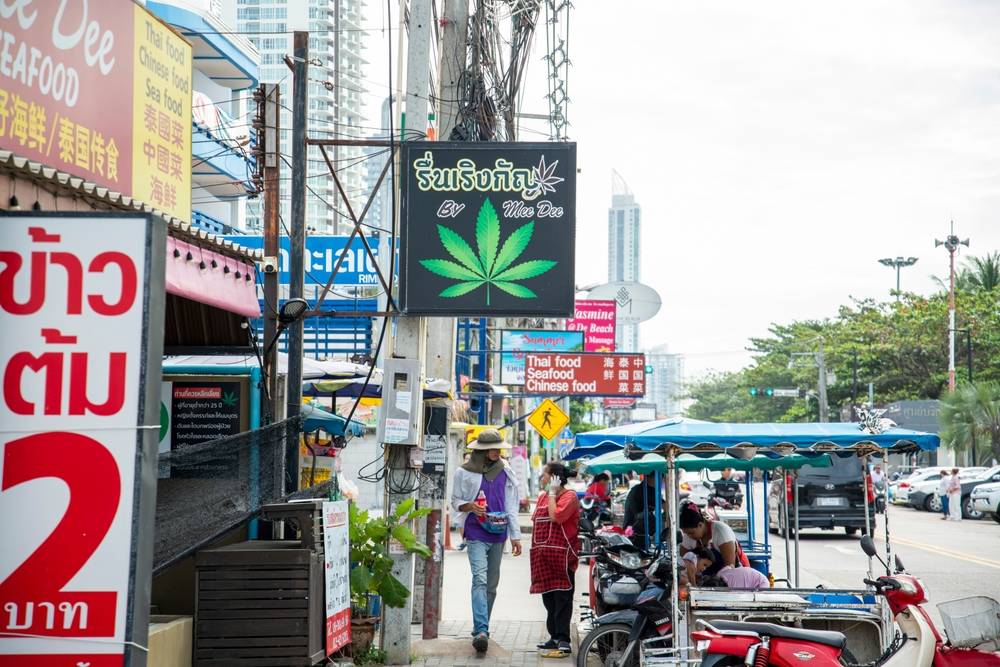Thailand’s Shift in Cannabis Regulation: A Health Perspective
In a pivotal policy shift, Thailand is proposing a ban on the recreational use of cannabis, signifying a major change in the nation’s stance towards the plant. This draft legislation, which concentrates exclusively on the medical and health-related uses of cannabis, presents critical considerations about the health implications and regulatory framework surrounding this contentious issue.
Contextualising Thailand’s Cannabis Policy Change
In 2022, Thailand became the first Southeast Asian nation to decriminalise cannabis, leading to a burgeoning industry projected to be worth up to $1.2 billion. However, the country’s new government is now proposing stringent measures to confine its usage to medical and health contexts.
The January 2024 draft bill, aims to clarify the legal ambiguities stemming from the plant’s decriminalisation. It reflects Prime Minister Srettha Thavisin’s commitment to limit cannabis utilisation primarily to prevent addiction risks. Health Minister Cholnan Srikaew emphasised the need to prohibit “wrong usage of cannabis,”. This signals a move away from the rushed and piecemeal regulations that initially left loopholes for recreational use.
Health Implications of Cannabis Regulation
The Thai government’s impending cannabis regulation highlights a crucial balance between the recognised medical benefits and potential health risks of cannabis use. Cannabis has shown efficacy in treating chemotherapy-induced nausea, reducing muscle spasms related to multiple sclerosis, and decreasing neuropathic pain intensity. Yet, it poses cognitive impairments and is advised against for those with mental health conditions.
The decision to re-regulate cannabis in Thailand, particularly the ban on recreational use, stems from these health concerns. The government aims to curtail the negative consequences of recreational cannabis. This includes addiction, mental health impacts, and public safety issues related to impaired driving. By focusing on medicinal applications, Thailand aligns with a global trend of recognising cannabis’s therapeutic benefits while mitigating its recreational risks.
Cannabis Regulation Details and Penalties
The draft bill proposes stringent penalties to enforce the new cannabis regulations in Thailand. For recreational use, fines can reach up to 60,000 baht (approximately $1,700), while advertising or marketing campaigns for recreational cannabis could lead to jail terms of up to one year or fines as high as 100,000 baht.
The legislation also intensifies punishment for unlicensed cannabis farming, with penalties ranging from one to three years in jail and fines between 20,000 baht to 300,000 baht. These measures aim to ensure compliance and address the previous regulatory gaps that allowed for recreational use. The bill’s introduction is a direct response to the government’s concerns over drug abuse and its commitment to limit cannabis use to medicinal purposes.
Implications for the Cannabis Industry and Public Health
Thailand’s proposed cannabis legislation is poised to significantly reshape the country’s cannabis industry, which flourished in a regulatory grey area since its decriminalisation. The industry, initially predicted to be worth $1.2 billion, saw the emergence of thousands of dispensaries, cannabis cafés, and related businesses.
The new regulations, by restricting cannabis use to medical and health purposes, are likely to contract this booming market. The focus on medical cannabis aligns with global trends, recognising the plant’s medicinal value while safeguarding against potential public health issues like addiction and impaired driving.
Feedback Process and Future Legislation
The Thai government has opened a window for public feedback on the draft cannabis legislation until January 23. This inclusive approach allows stakeholders, including those from the cannabis industry and the public, to voice their opinions and concerns.
Following this period, the Cabinet will review the feedback before presenting it to Parliament for further deliberation. The legislation’s finalisation and implementation, anticipated around March or April 2024, will mark a significant milestone in Thailand’s approach to cannabis regulation, potentially setting a precedent for other countries in the region.
Thailand’s journey from decriminalising to potentially re-regulating cannabis underscores a delicate balance between public health concerns and legislative control. The draft bill reflects a cautious yet proactive approach to cannabis regulation. As the world continues to grapple with the complexities of cannabis legalisation, Thailand’s evolving policy offers valuable insights into managing the plant’s potential benefits against its risks. This approach, prioritising health and safety, may serve as a model for other nations navigating similar challenges.
References
- Thailand seeks public opinion on draft to end recreational cannabis use. (n.d.). REUTERS. https://www.reuters.com/world/asia-pacific/thailand-seeks-public-opinion-draft-end-recreational-cannabis-use-2024-01-10/
- Thailand Moves to Ban Recreational Use of Cannabis in Setback for Nascent Industry. (2024, January 9). Retrieved January 10, 2024, from https://www.bloomberg.com/news/articles/2024-01-09/thailand-moves-to-end-recreational-cannabis-use-in-setback-for-nascent-industry
- Marijuana. (2023, August 10). Mayo Clinic. https://www.mayoclinic.org/drugs-supplements-marijuana/art-20364974
- Professional, C. C. M. (n.d.). Marijuana (Cannabis, Weed). Cleveland Clinic. https://my.clevelandclinic.org/health/articles/4392-marijuana-cannabis
- Know the Risks of Marijuana. (2023, February 27). https://www.samhsa.gov/marijuana












